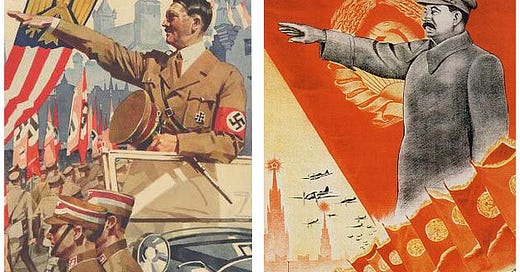Perhaps the biggest lie of the 20th century is that Hitler was right wing. True, he was to the right of Marx, but he was a mainstream Leftist who gained power by way of a democratic election. He was a Socialist by the standards of his day and still appeals today to the products of an East German Communist upbringing. As the psychoanalyst Richard A. Koenigsberg explains, ‘in terms of the ideology Hitler put forth, he was not unusual. What Hitler did was to embrace and promote certain very popular, conventional political ideas—and carry them to a bizarre fulfilment.’
One of these ideas was revolution itself, the opium of Leftist intellectuals. In Mein Kampf, Hitler described his political movement as ‘a declaration of war against…the structure of the world which presently exists’ and as having a 'revolutionary creative will’. And the 25 point plan of the National Socialist German Workers Party narrowed down this standard Leftist revolutionary vision: Hitler championed the rights of workers, regarded capitalist society as unjust and sought to take large-scale economic decision-making out of private hands and put it into those of government planning agencies. The Swastika was a socialist symbol long before Hitler, its two arms representing two entwined letters "S" (for “Socialist”).
But what about Hitler’s nationalism, militarism and anti-Semitism? Were those popular Leftist ideas? Yes. Engels called ‘the reconquest of the German-speaking left bank of the Rhine…a matter of national honour’ and wrote of ‘the last, holy war which will be followed by the thousand-year reign of freedom.’ Hitler’s thousand-year Reich merely echoed this. And Marx, in words foreshadowing Hitler’s Final Solution, said ‘in the final analysis, the emancipation of the Jews is the emancipation of mankind from Jewry’. In The Lost Literature of Socialism, historian George Watson notes that, ‘in the European century that began in the 1840s, from Engels' article of 1849 down to the death of Hitler, everyone who advocated genocide called himself a socialist and no conservative, liberal, anarchist or independent did anything of the kind.’ Even the Nazi conception of race is in fact still held by progressives today. Derived from the work of Houston Stewart Chamberlain, it rejected biology. According to anthropologist Robert Gayre, Chamberlain taught it was ‘only out of racial mixture that the gifted could be created…a "race," not of blood but of “affinity.”
So great were the similarities between the Nazis and the Bolsheviks that, according to Artur Axmann, the Nazi youth leader, ‘starch-collared men like Chancellor Heinrich Bruening had called us the "Brown Bolsheviks," and their bourgeois instincts were not wrong’. As the economist Ludwig von Mises observed, the Nazis ‘imported from Russia the one-party system and the privileged role of this party and its members in public life; the paramount position of the secret police; the organization of affiliated parties abroad which are employed in fighting their domestic governments and in sabotage and espionage, assisted by public funds and the protection of the diplomatic and consular service; the administrative execution and imprisonment of political adversaries; concentration camps; the punishment inflicted on the families of exiles; the methods of propaganda. They have borrowed from the Marxians even such absurdities as the mode of address, party comrade (Parteigenosse), derived from the Marxian comrade (Genosse), and the use of a military terminology for all items of civil and economic life. The question is not in which respects both systems are alike but in which they differ."
As Hitler himself said, ‘there is more that binds us to Bolshevism than separates us from it’. And the differences von Mises then outlines concern methodology rather than ideology: ‘In the Nazi economy there was no question of private initiative and free enterprise…No enterprise was free to deviate in the conduct of its operations from the orders issued by the government…What made it difficult for many people to grasp the very nature of the Nazi economic system was the fact that the Nazis did not expropriate the entrepreneurs and capitalists openly and that they did not adopt the principle of income equality which the Bolshevists espoused in the first years of Soviet rule and discarded only later. Yet the Nazis removed the bourgeois completely from control.’ Steel magnate Fritz Thyssen fled to Switzerland because he believed that Nazi planning was 'Bolshevising' Germany.
As Hitler said, ‘Let them own land or factories as much as they please. The decisive factor is that the State, through the Party, is supreme over them regardless of whether they are owners or workers. All that is unessential; our socialism goes far deeper. It establishes a relationship of the individual to the State, the national community. Why need we trouble to socialize banks and factories? We socialize human beings."
That is the answer to the common objection that Hitler couldn’t have been a socialist because socialism requires worker ownership and control of the means of production. Only to Marxists, however: Leonard Peikoff explains that, contrary to the Marxists, ‘the Nazis did not advocate public ownership of the means of production’, but they demanded that the government ‘oversee and run the nation's economy. The issue of legal ownership, they explained, is secondary; what counts is the issue of CONTROL.’ As George Reisman explains, ‘what Mises identified was that private ownership of the means of production existed in name only under the Nazis and that the actual substance of ownership of the means of production resided in the German government. For it was the German government and not the nominal private owners that exercised all of the substantive powers of ownership’.
But how did Hitler’s nationalism fit with his socialism? Nationalist socialism is a very old phenomenon, as Napoleon shows. The various European Socialist parties in World War I supported their national governments, not universal brotherhood. Hayek showed that German Nazism was not, as often claimed, an aberrant “right-wing” perversion growing out of the “contradictions” of capitalism. Instead, it developed out of the “enlightened” and “progressive” socialist and collectivist ideas of the pre-World War I era. The modern welfare state was born in Bismarck’s Germany: national health insurance, government pension plans, regulations of industry and the workplace, and a philosophy that the national good took precedence over the interests of the “mere” individual. The Germans came to believe in a paternalistic state meant to care for them from “cradle to grave” - a phrase coined in Imperial Germany. For the sake of the nation, beliefs in the right to private property and freedom of exchange were undermined. The enlightened leaders knew best. The regulatory and redistributive state increasingly managed the economic activities of society.
Significantly, Hitler and his associates very much admired President Franklin Roosevelt's New Deal for imposing a network of fascist-style economic controls on private industry and agriculture. The Supreme Court declared most of these controls unconstitutional in 1935, but by 1933, when Hitler came to power, the German people not only accepted the idea of the “führer principle,” Hayek argued, but many now wanted it and believed they needed it. Notions about individual freedom and responsibility had been destroyed by the philosophy of collectivism and the ideologies of nationalism and socialism. Sebastian Haffner, author of the excellent memoir Resisting Hitler, observed that ‘the great danger of life in Germany has always been emptiness and boredom ... The menace of monotony hangs, as it has always hung, over the great plains of northern and eastern Germany, with their colourless towns and their all too industrious, efficient, and conscientious business and organisations. With it comes a horror vacui and the yearning for 'salvation': through alcohol, through superstition, or, best of all, through a vast, overpowering, cheap mass intoxication.”
The Encyclopedia Brittanica answers the question ‘were the Nazis socialists?’ by saying ‘no, not in any meaningful way, and certainly not after 1934’ on the basis of the following claims:
Hitler only ‘paid lip service to the tenets suggested by the name National Socialist German Workers’ Party, but his primary—indeed, sole—focus was on achieving power whatever the cost and advancing his racist, anti-Semitic agenda’. But as we’ve seen racism and anti-Semitism were standard for socialists, as is the desire to increase the power of the state.
‘The brothers Otto and Gregor Strasser did much to grow the party by tying Hitler’s racist nationalism to socialist rhetoric that appealed to the suffering lower middle classes.’ The mistaken assumption here is that the racist nationalism wasn’t essentially socialist. It was.
Hitler ‘enlisted support from wealthy industrialists who sought to pursue avowedly anti-socialist policies’. But as we’ve seen, Hitler ensured that the government exercised all the substantive powers of ownership. And Hitler wisely drew the leaders of German conservative and nationalist movements such as President Hindenburg into his campaign to make himself look like a safe choice.
In 1930 Otto broke away to form the anti-capitalist Schwarze Front (Black Front) because he recognized that the Nazis were neither a party of socialists nor a party of workers. But the left is famous for such ideological splits, and nationalism has often been crucial to them. In Russia, the Bolsheviks split into Leninists and Trotskyites, and in Italy Mussolini, one of the country’s leading Marxist theoreticians, left Italy's major Marxist party to found the Fascists. Hitler was to the right of Marx but still far left.
‘In April 1933 communists, socialists, democrats, and Jews were purged from the German civil service, and trade unions were outlawed the following month.’ Again, however, internal rivalry among leftists is standard; so is the anti-Semitism. Marx despised Jews. And the orthodox leftists who represented the German labour unions (the SPD) and the Communists (KPD) voted with the Nazis in the Reichstag (German Parliament) on various important occasions. Only at the the passage of the "Enabling Act" that gave Hitler absolute power did the SPD oppose the Nazis resolutely. They knew where it would lead.
‘Hitler banned all political parties other than his own, and prominent members of the German Communist Party and the Social Democratic Party were arrested and imprisoned in concentration camps.' Of course he did: the imported the one-party system and concentration camps from Russia.
‘Hitler ordered the murder of Gregor Strasser, an act that was carried out on June 30, 1934, during the Night of the Long Knives. Any remaining traces of socialist thought in the Nazi Party had been extinguished.’ But although Strasser was certainly extinguished, this no more extinguished socialist thought in the Nazi Party than the ice-pick in the head Trotsky got from Stalin extinguished socialism in Russia. In the dying days of the Third Reich, in 1943, the Nazis made a propaganda film of the Titanic’s fatal voyage of 1912, blaming its sinking on greedy capitalists in the UK and USA who wanted to set a "speed record" for a cruise-ship traveling from England to NYC, thinking this would increase profits and the value of the company's stock.
As Peter Hitchens pointed out, Soviet oil fuelled the Nazi Blitzkrieg and the tanks of Hitler's Panzern as they stormed France. They also shared ideological fuel. Ultimately, as Tzvetan Todorov argued in Facing the Extreme, both Nazism and Communism seek the happiness of humanity, but only once the bad guys have been separated out of it - by whatever means necessary.
References
http://jonjayray1.blogspot.com/2013/11/as-radical-nationalism-will-love-your.html
https://www.marxists.org/archive/marx/works/1841/01/arndt.htm
https://marxists.architexturez.net/archive/marx/works/1841/anti-schelling/ch05.htm
https://www.marxists.org/archive/marx/works/1844/jewish-question/
thebookshelf2015.blogspot.com/2017/04/the-lost-literature-of-socialism.html
jtl.org/links/gayre.html
Axmann quoted in James P. O'Donnell's THE BUNKER (1978, Boston, Houghton Mifflin, pp. 261-262)
https://mises.org/library/socialist-calumny-against-jews
'There is more that binds us to Bolshevism than separates us from it’ and 'let them own land' both quoted in https://archive.org/details/in.ernet.dli.2015.505385/page/n133/mode/2up?q=binds+us
https://freerepublic.com/focus/news/704277/posts www.mises.org/story/1937
https://www.britannica.com/story/were-the-nazis-socialists
Shil's table - Studies in the Scope and Method of the Authoritarian Personality (Glencoe, 1954), pp.33-34














Share this post